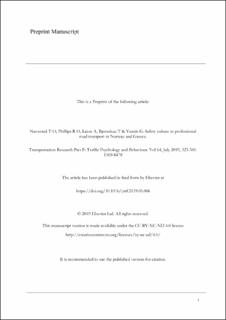| dc.contributor.author | Nævestad, Tor-Olav | |
| dc.contributor.author | Phillips, Ross Owen | |
| dc.contributor.author | Laiou, Alexandra | |
| dc.contributor.author | Bjørnskau, Torkel | |
| dc.contributor.author | Yannis, George | |
| dc.coverage.spatial | Norway and Greece | en_US |
| dc.date.accessioned | 2021-08-04T16:54:56Z | |
| dc.date.available | 2021-08-04T16:54:56Z | |
| dc.date.created | 2019-06-12T10:42:03Z | |
| dc.date.issued | 2019-06-10 | |
| dc.identifier.citation | Transportation Research Part F: Traffic Psychology and Behaviour. 2019, 64 (July), 323-341. | en_US |
| dc.identifier.issn | 1369-8478 | |
| dc.identifier.uri | https://hdl.handle.net/11250/2766315 | |
| dc.description.abstract | The aims of the present paper are to: (1) Examine the influence of national safety culture, sector safety focus and organizational safety culture on the safety behaviours of profes-sional drivers, compared with other explanatory variables (e.g. age, type of transport, working conditions), and to (2) Examine the influence of safety behaviours and other fac-tors (e.g. age, mileage, type of transport) on self-reported crash involvement. A survey was conducted, including 215 bus drivers in Norway and Greece. Our study provides four main results. First, more bus drivers in Greece than in Norway report being involved in more aggressive violations in traffic (e.g. become angered by other drivers and indicate hostility, sound their horn). Second, aggressive violations were predicted by national road safety cul-ture, specified as descriptive norms (‘‘violations”) and values/attitudes (individual freedom to take risk in traffic). Third, Greek bus drivers’ aggressive violations in traffic predicted their self-reported crash involvement, although reports on ‘‘work related variables” (e.g. experi-enced work pressure) were more strongly correlated with their crash involvement than their self-reported aggressive violations. Fourth, organizational safety culture contributed nega-tively to aggressive road safety behaviours, meaning that a positive organizational safety cul-ture may reduce (the negative impact of national road safety culture on) aggressive violations in traffic. Although more research is needed, our study indicates a relationship between national road safety culture, road safety behaviour and crash involvement, that could be developed further to help explain differences in national road safety records. | en_US |
| dc.language.iso | eng | en_US |
| dc.publisher | Elsevier | en_US |
| dc.rights | Attribution-NonCommercial-NoDerivatives 4.0 Internasjonal | * |
| dc.rights.uri | http://creativecommons.org/licenses/by-nc-nd/4.0/deed.no | * |
| dc.title | Safety culture among bus drivers in Norway and Greece | en_US |
| dc.type | Peer reviewed | en_US |
| dc.type | Journal article | en_US |
| dc.rights.holder | © 2019 Elsevier Ltd. All rights reserved. | en_US |
| dc.description.version | submittedVersion | en_US |
| cristin.unitcode | 7482,2,3,0 | |
| cristin.unitcode | 7482,2,2,0 | |
| cristin.unitname | System og kultur | |
| cristin.unitname | Atferd og transport | |
| cristin.ispublished | true | |
| cristin.fulltext | preprint | |
| cristin.qualitycode | 1 | |
| dc.identifier.doi | 10.1016/j.trf.2019.05.006 | |
| dc.identifier.cristin | 1704248 | |
| dc.source.journal | Transportation Research Part F: Traffic Psychology and Behaviour | en_US |
| dc.source.volume | 64 | en_US |
| dc.source.issue | July | en_US |
| dc.source.pagenumber | 323-341 | en_US |
| dc.relation.project | Norges forskningsråd: 250298 | en_US |

